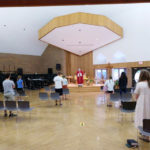By Corrine Winter
When I was working on my BA in English at St. Olaf College in Minnesota, at about this time each year I would see posters and bulletin boards celebrating the work of Martin Luther. Lutheran students and faculty would gather on Oct. 31 to celebrate “Reformation Day” in honor of Luther’s call for reform of the church.

Oct. 31, 2017, will mark 500 years since Luther first issued that call. Lutherans throughout the world are preparing for the celebration. What Catholics may not realize is that our pope and bishops are calling us to commemorate the occasion with them. Indeed, Pope Francis is scheduled to mark the anniversary in Sweden on Oct 31. We are asked to recognize and rejoice in growing understanding and agreement between our two churches on many issues that were once sources of conflict. We are also urged to be part of the continuing efforts toward communion with Lutherans and among all Christian denominations.
The 16th century was a time of political turmoil and social change. In that context, misunderstandings too easily led to division and disagreements to polemic rather than to constructive dialogue. Careful historical research, dialogue, shared prayer and discernment led Catholics and Lutherans to an agreed statement on Justification in 1999. That was a monumental achievement because the document addresses the foundational theological issue raised by Luther in 1517.
Many Catholics seem to be most aware that Luther objected to the practice of “selling indulgences,” a practice also condemned at the Council of Trent. But for Luther, the practice of granting indulgences was just one glaring bit of evidence of a tendency among Catholics to think in terms of deserving or earning salvation through “good works.” Luther insisted that we are saved by faith alone, and that because of the effects of sin we are incapable of doing good works. For Luther, any good we do is the effect of God’s free gift of grace. We should not consider any of our own work worthy of merit. Following confrontations between Luther and members of the Catholic hierarchy, mutual condemnations were issued. The differences were viewed on both sides as irreconcilable.
The 1999 statement includes a declaration that Catholics and Lutherans share the conviction that, “By grace alone, in faith in Christ’s saving work … we are accepted by God and receive the Holy Spirit, who renews our hearts while equipping and calling us to good works.” Good works are described as fruits of justification (n. 37). The document also includes a statement that Catholics understand our cooperation with God’s grace to be, in itself, an effect of grace. The agreement expressed in the declaration is described as agreement on the fundamental issues involved in the doctrine of justification. Differences remain between the two denominations and further dialogue is essential.
Since 1999, official Lutheran-Catholic dialogue has produced statements on hope for eternal life, on the church as a community of salvation and, most recently, on areas of agreement and remaining disagreement regarding church, ministry and Eucharist. The first two statements have been officially accepted by both the Lutheran World Federation and the Pontifical Council for Promoting Christian Unity. The “Declaration on the Way,” which includes 32 statements on church, Eucharist and ministry, has been accepted by the Lutheran World Federation, and U.S. Conference of Catholic Bishops have responded positively, commending it to the Pontifical Council. None of the statements from the bilateral dialogue has stated or implied that the two denominations have reached or are on the verge of reaching complete agreement. Important differences remain and to gloss over them would do more to end than to promote continuing conversations. We owe one another more respect than that.
In 2012, the International Lutheran-Roman Catholic Commission on Unity issued a document on the upcoming anniversary of Martin Luther. That document, titled “From Conflict to Communion,” urged that in our encounters with one another, Lutherans and Catholics “always begin from the perspective of unity.” The efforts outlined above are those of official bodies of the two churches and, of course, official doctrinal agreements must be reached through those channels. At the same time, all of us can participate in shared prayer, reflections on the life of faith, and work for social justice, among other efforts, that will build on our real, if incomplete unity.
The ecumenical movement began with the conviction that in a disuniting world, Christians ought to provide a witness to the possibility of unity in diversity. Lumen Gentium describes the church as a sign and sacrament of the communion with God to which all creation is called. One aspect of being such a sign is exploring what unites us with other Christians.
(Corinne Winter is a professor of theology at St. Ambrose University in Davenport.)











